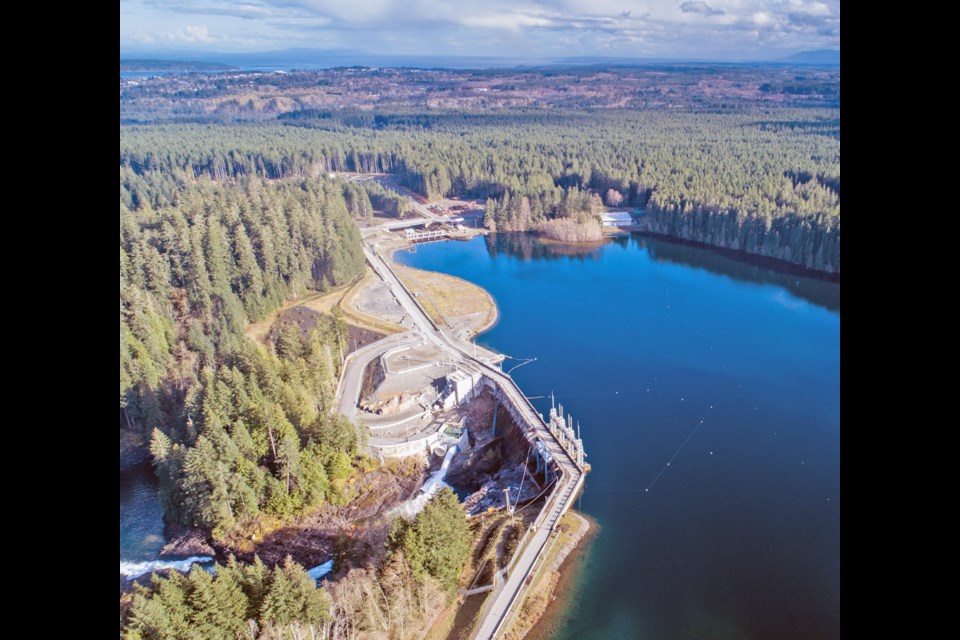B.C. Hydro is drawing up plans to upgrade three dams near Campbell River in case a major earthquake hits the area.
Construction plans aim to improve and strengthen the structures so that the structures, which are each more than 70 years old, will survive a severe quake. B.C. Hydro would then lower the level of the reservoirs to relieve pressure on the dams following a quake.
If required approvals and funds come through, construction would begin in 2023 and 2024, said Stephen Watson, Hydro’s stakeholder engagement adviser.
The projects are expected to cost $750 million in total.
Hydro spent $1.1 billion on the John Hart Generating Station replacement project at Campbell River. Now it’s looking at upgrading the three upstream dams — the John Hart, Ladore and Strathcona dams, which were built in the 1940s and 1950s. The largest project of the three is the John Hart dam, Watson said.
In each case, applications will be submitted to the B.C. Utilities Commission. If approved, they will then go to B.C. Hydro’s board of directors for funding approval. First on the to-do list is John Hart.
B.C. Hydro has been preparing for many years. It initiated a six-year, $10-million Probabilistic Seismic Hazard Analysis study, releasing results in 2014.
“This was a model for calculating earthquake hazards to help evaluate dam assessments and validate future resulting upgrades,” Watson said.
“The highest risk is on Vancouver Island given its proximity to the Earth's shifting tectonic plates in the Cascadia subduction zone.”
A Cascadia subduction zone earthquake may result in a magnitude-9.0 earthquake lasting for about three minutes. Such earthquakes strike about every 300 to 800 years. The last event was on Jan. 26, 1700, he said.
Even though the three dams near Campbell River are in better shape than when they were first built — thanks to some upgrades — they do not meet today’s standards, Watson said.
“If we get a major earthquake, two of the dams could potentially fail,” he said. Those are the John Hart and Strathcona dams, which are earth-filled using gravel, rock and boulders.
The Ladore dam is concrete on bedrock, but requires new spillway gates.
If the John Hart and Strathcona dams failed, the water could reach downtown Campbell River in about an hour, Watson said.
The John Hart dam is slightly more than 800 metres long. The plan is to add upstream and downstream berms that will create a wider dam and make it more robust and thus better able to withstand shaking, he said.
The reservoir would be dredged and additional earth-fill material would be placed on top of the upstream berm.
A second seepage barrier would be installed to prevent water going over the top of the dam. Three spillway gates would be replaced, which would allow water to safely go downstream, and a new overflow spillway would be added.
B.C. Hydro will be writing its John Hart application to the B.C. Utilities Commission this month, with plans to submit it in early 2021, Watson said.
“The application is very comprehensive document that lays out the facilities and the argument of why we are looking for regulatory approval for the large capital investment. It's many hundreds of pages long and some areas can be quite technical,” Watson said.
The document will include background on the seismic risk, the engineering involved, and several options. This will include B.C. Hydro’s recommended option, which it expects would allow the dam to withstand a major earthquake, he said.
It will also include construction plans, cost, First Nations consultation results, stakeholder engagement comments, environmental considerations, and more, Watson said.
“All of these project components continue to move forward in tandem and are being refined; we’re not done yet,” he said.
“So this month we began to lay out the application groundwork of all the areas to clarify and fill in so we put forth very good reasoning to the B.C. Utilities Commission.”
After being submitted, B.C. Hydro will go through a project review process with the commission.
Construction could start in 2023 on the John Hart component and be completed in about four years, he said. The Ladore and Strathcona dam work would take an estimated three years each.
After a major earthquake, B.C. Hydro would likely draw down its reservoirs quickly, releasing water through the spillways in a controlled manner to ease pressure on the dams, Watson said. The Ladore dam’s spillway gates would be replaced at a lower elevation to allow that to happen.
The Strathcona dam’s three spillway gates were installed in the 1950s for flood-risk management. But their elevation in relation to the reservoir is higher than the other two dams, meaning B.C. Hydro would not have the technical ability to lower the reservoir after a large earthquake, he said.
Plans call for construction of an excavated channel that is 330 metres long, 17 metres wide and 29 metres deep, Watson said. That channel will connect to the existing spillway channel and the spillway gates will be replaced at a lower elevation in the excavated channel to allow B.C. Hydro to lower the reservoir.
A concrete overflow spillway will be built where the current spillway gates are located, he said.
As B.C. Hydro embarks on planning it faces the province-wide shortage of construction workers. To help develop workers for these three projects, Hydro is setting up scholarships for trades training.
This past fall, B.C. Hydro offered seven $1,000 scholarships to North Island College trades students in Campbell River and the Comox Valley. It will be providing six scholarships each fall from 2020 through 2023 for four years of scholarships.
Visit the Campbell River Hydroelectric Facilities Discovery Centre, beside the Elk Falls suspension bridge parking lot off Highway 28, to learn more about these projects and fill out community engagement forms.



